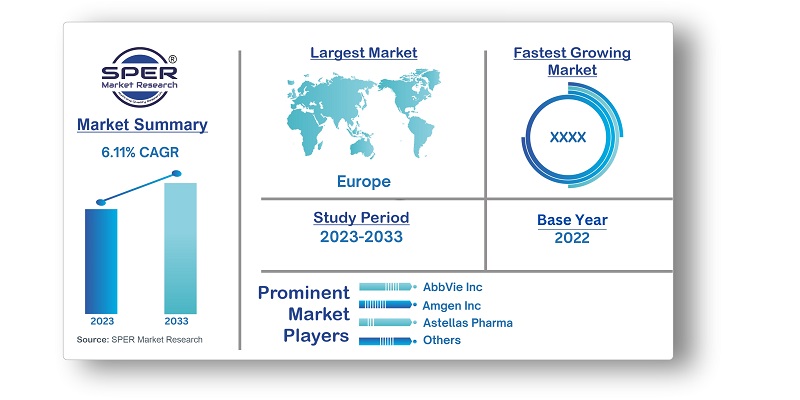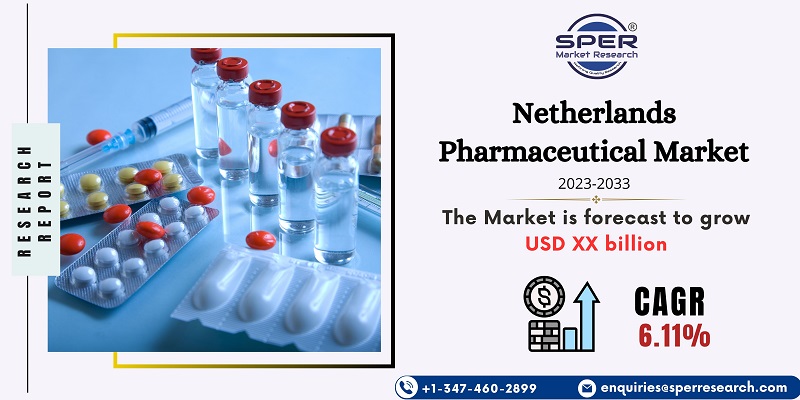
Netherlands Pharmaceutical Market Growth, Size, Trends, Revenue, Share and Future Competition
Netherlands Pharmaceutical Market Size- By ATC/Therapeutic Class, By Mode of Dispensing- Regional Outlook, Competitive Strategies and Segment Forecast to 2033
| Published: Dec-2023 | Report ID: PHAR2316 | Pages: 1 - 107 | Formats*: |
| Category : Pharmaceutical | |||
- July 2022: A warning letter was sent by the US FDA to a Dutch manufacturer of APIs, or active pharmaceutical ingredients. It was given notice to implement stronger procedures for cleaning equipment and greater safety measures to avoid cross-contamination.
- May 2022: The Netherlands-based pharmaceutical business Centrient Pharmaceuticals has declared that it has fully complied with the anti-microbial resistance industry alliance's strict Predicted No Effect Concentration (PNEC) discharge targets for the clean production of its whole line of oral antibiotic products.


| Report Metric | Details |
| Market size available for years | 2019-2033 |
| Base year considered | 2022 |
| Forecast period | 2023-2033 |
| Segments covered | By ATC/Therapeutic Class, By Mode of Dispensing |
| Regions covered | East Netherlands, North Netherlands, South Netherlands, West Netherlands |
| Companies Covered | Abbott Laboratories, AbbVie Inc., Amgen Inc., Astellas Pharma, AstraZeneca PLC, F. Hoffmann-La Roche AG, Johnson & Johnson, Merck & Co., Novartis AG, Pfizer Inc., Others |
- Government Health Departments
- Healthcare Professionals
- Patients and Patient Advocacy Groups
- Pharmaceutical Companies
- Pharmacy Chains and Retailers
- Research and Development Institutes
- Others
| By ATC/Therapeutic Class |
|
| By Mode of Dispensing |
|
| By Region |
|
- Netherlands Pharmaceutical Market Size (FY’2023-FY’2033)
- Overview of Netherlands Pharmaceutical Market
- Segmentation of Netherlands Pharmaceutical Market By ATC/Therapeutic Class (Alimentary Tract and Metabolisma, Antiinfectives for Systemic Use, Antineoplastic and Immunomodulating Agents, Antiparasitic Products, Insecticides, and Repellents, Blood and Blood-forming Organs, Cardiovascular System, Dermatological Drugs, Genitourinary System and Reproductive Hormones, Musculoskeletal System, Nervous System, Respiratory System, Sensory Organs, Systemic Hormonal Preparations, Excluding Reproductive Hormones and Insulins, Various ATC Structures)
- Segmentation of Netherlands Pharmaceutical Market By Mode of Dispensing (OTC, Prescription)
- Statistical Snap of Netherlands Pharmaceutical Market
- Expansion Analysis of Netherlands Pharmaceutical Market
- Problems and Obstacles in Netherlands Pharmaceutical Market
- Competitive Landscape in the Netherlands Pharmaceutical Market
- Impact of COVID-19 and Demonetization on Netherlands Pharmaceutical Market
- Details on Current Investment in Netherlands Pharmaceutical Market
- Competitive Analysis of Netherlands Pharmaceutical Market
- Prominent Players in the Netherlands Pharmaceutical Market
- SWOT Analysis of Netherlands Pharmaceutical Market
- Netherlands Pharmaceutical Market Future Outlook and Projections (FY’2023-FY’2033)
- Recommendations from Analyst
1.1. Scope of the report1.2. Market segment analysis
2.1. Research data source
2.1.1. Secondary Data2.1.2. Primary Data2.1.3. SPER’s internal database2.1.4. Premium insight from KOL’s
2.2. Market size estimation
2.2.1. Top-down and Bottom-up approach
2.3. Data triangulation
4.1. Driver, Restraint, Opportunity and Challenges analysis4.1.1. Drivers4.1.2. Restraints4.1.3. Opportunities4.1.4. Challenges
4.2. COVID-19 Impacts of the Netherlands Pharmaceutical Market
5.1. SWOT Analysis
5.1.1. Strengths5.1.2. Weaknesses5.1.3. Opportunities5.1.4. Threats
5.2. PESTEL Analysis
5.2.1. Political Landscape5.2.2. Economic Landscape5.2.3. Social Landscape5.2.4. Technological Landscape5.2.5. Environmental Landscape5.2.6. Legal Landscape
5.3. PORTER’s Five Forces
5.3.1. Bargaining power of suppliers5.3.2. Bargaining power of buyers5.3.3. Threat of Substitute5.3.4. Threat of new entrant5.3.5. Competitive rivalry
5.4. Heat Map Analysis
6.1. Netherlands Pharmaceutical Market Manufacturing Base Distribution, Sales Area, Product Type6.2. Mergers & Acquisitions, Partnerships, Product Launch, and Collaboration in Netherlands Pharmaceutical Market
7.1. Netherlands Pharmaceutical Market Value Share and Forecast, By ATC/Therapeutic Class, 2023-20337.2. Alimentary Tract and Metabolisma7.3. Antiinfectives for Systemic Use7.4. Antineoplastic and Immunomodulating Agents7.5. Antiparasitic Products, Insecticides, and Repellents7.6. Blood and Blood-forming Organs7.7. Cardiovascular System7.8. Dermatological Drugs7.9. Genitourinary System and Reproductive Hormones7.10. Musculoskeletal System7.11. Nervous System7.12. Respiratory System7.13. Sensory Organs7.14. Systemic Hormonal Preparations, Excluding Reproductive Hormones and Insulins7.15. Various ATC Structures
8.1. Netherlands Pharmaceutical Market Value Share and Forecast, By Mode of Dispensing, 2023-20338.2. OTC8.3. Prescription
9.1. Netherlands Pharmaceutical Market Size and Market Share
10.1. Netherlands Pharmaceutical Market Size and Market Share By ATC/Therapeutic Class (2019-2026)10.2. Netherlands Pharmaceutical Market Size and Market Share By ATC/Therapeutic Class (2027-2033)
11.1. Netherlands Pharmaceutical Market Size and Market Share By Mode of Dispensing (2019-2026)11.2. Netherlands Pharmaceutical Market Size and Market Share By Mode of Dispensing (2027-2033)
12.1. Netherlands Pharmaceutical Market Size and Market Share By Region (2019-2026)12.2. Netherlands Pharmaceutical Market Size and Market Share By Region (2027-2033)12.3. East Netherlands12.4. North Netherlands12.5. South Netherlands12.6. West Netherlands
13.1. Abbott Laboratories
13.1.1. Company details13.1.2. Financial outlook13.1.3. Product summary13.1.4. Recent developments
13.2. AbbVie Inc.
13.2.1. Company details13.2.2. Financial outlook13.2.3. Product summary13.2.4. Recent developments
13.3. Amgen Inc.
13.3.1. Company details13.3.2. Financial outlook13.3.3. Product summary13.3.4. Recent developments
13.4. Astellas Pharma
13.4.1. Company details13.4.2. Financial outlook13.4.3. Product summary13.4.4. Recent developments
13.5. AstraZeneca PLC
13.5.1. Company details13.5.2. Financial outlook13.5.3. Product summary13.5.4. Recent developments
13.6. F. Hoffmann-La Roche AG
13.6.1. Company details13.6.2. Financial outlook13.6.3. Product summary13.6.4. Recent developments
13.7. Johnson & Johnson
13.7.1. Company details13.7.2. Financial outlook13.7.3. Product summary13.7.4. Recent developments
13.8. Merck & Co.
13.8.1. Company details13.8.2. Financial outlook13.8.3. Product summary13.8.4. Recent developments
13.9. Novartis AG
13.9.1. Company details13.9.2. Financial outlook13.9.3. Product summary13.9.4. Recent developments
13.10. Pfizer Inc.
13.10.1. Company details13.10.2. Financial outlook13.10.3. Product summary13.10.4. Recent developments
13.11. Others
SPER Market Research’s methodology uses great emphasis on primary research to ensure that the market intelligence insights are up to date, reliable and accurate. Primary interviews are done with players involved in each phase of a supply chain to analyze the market forecasting. The secondary research method is used to help you fully understand how the future markets and the spending patterns look likes.
The report is based on in-depth qualitative and quantitative analysis of the Product Market. The quantitative analysis involves the application of various projection and sampling techniques. The qualitative analysis involves primary interviews, surveys, and vendor briefings. The data gathered as a result of these processes are validated through experts opinion. Our research methodology entails an ideal mixture of primary and secondary initiatives.



Frequently Asked Questions About This Report
PLACE AN ORDER
Year End Discount
Sample Report
Pre-Purchase Inquiry
NEED CUSTOMIZATION?
Request CustomizationCALL OR EMAIL US
100% Secure Payment






Related Reports
Our Global Clients
Our data-driven insights have influenced the strategy of 200+ reputed companies across the globe.






















